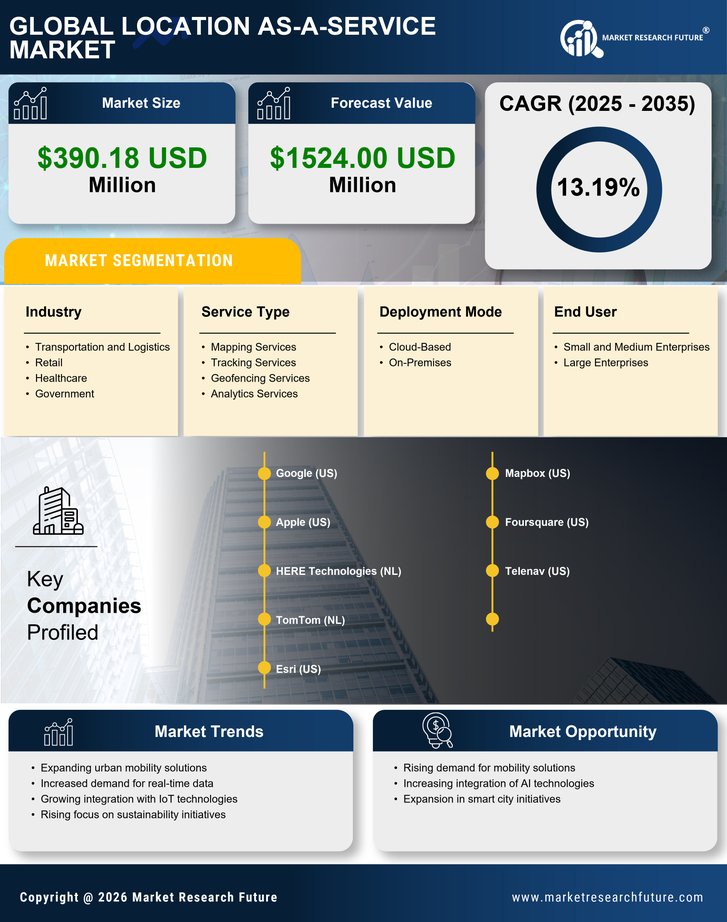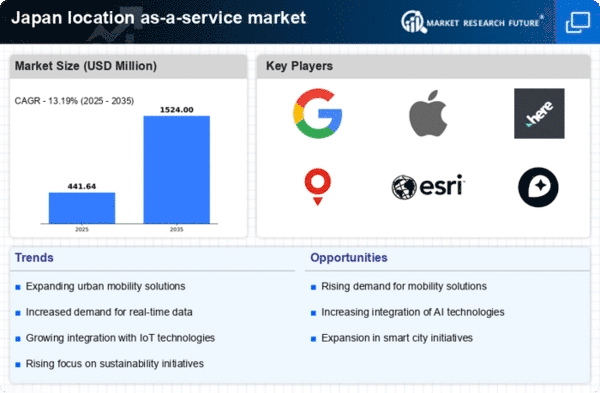Expansion of Smart City Initiatives
Japan's commitment to developing smart cities significantly influences the location as-a-service market. As urban areas increasingly integrate technology to improve infrastructure and services, the demand for location-based services rises correspondingly. Smart city projects often incorporate location data to manage traffic flow, enhance public safety, and optimize resource allocation. For example, Tokyo's smart city initiatives utilize location services to monitor and manage urban mobility effectively. The Japanese government has allocated substantial funding, estimated at over ¥1 trillion, to support these initiatives, which is likely to bolster the location as-a-service market. This investment not only enhances urban living but also creates new opportunities for service providers in the location as-a-service market.
Rising Demand for Real-Time Location Data
The location as-a-service market in Japan experiences a notable surge in demand for real-time location data. This demand is driven by various sectors, including retail, logistics, and transportation, which increasingly rely on accurate location information to enhance operational efficiency. For instance, the logistics sector utilizes real-time tracking to optimize delivery routes, thereby reducing costs and improving customer satisfaction. According to recent estimates, the market for real-time location services in Japan is projected to grow at a CAGR of approximately 15% over the next five years. This growth reflects a broader trend where businesses seek to leverage location data to gain competitive advantages, indicating a robust future for the location as-a-service market.
Growth of E-Commerce and Delivery Services
The rapid expansion of e-commerce in Japan has a profound impact on the location as-a-service market. With online shopping becoming increasingly popular, businesses require efficient delivery solutions that rely heavily on location data. Companies are investing in location-based technologies to streamline their logistics and improve delivery times. Reports indicate that the e-commerce sector in Japan is expected to reach ¥20 trillion by 2025, driving the need for advanced location services. This growth presents a significant opportunity for the location as-a-service market, as businesses seek to enhance their operational capabilities and customer experiences through precise location tracking and management.
Regulatory Support for Location-Based Services
The regulatory environment in Japan is becoming increasingly supportive of location-based services, which positively impacts the location as-a-service market. The government has implemented policies that encourage the use of geospatial data for various applications, including urban planning and disaster management. These regulations aim to enhance public safety and improve infrastructure efficiency. For example, the Ministry of Land, Infrastructure, Transport and Tourism has initiated programs to promote the use of location data in urban development projects. This regulatory support is likely to foster innovation and growth within the location as-a-service market, as businesses align their services with government initiatives and standards.
Increased Focus on Enhanced Customer Experiences
In Japan, businesses are increasingly prioritizing customer experience, which directly influences the location as-a-service market. Companies are leveraging location data to personalize services and improve customer interactions. For instance, retailers utilize geolocation to send targeted promotions to customers' mobile devices when they are near a store. This strategy not only drives foot traffic but also enhances customer engagement. As consumer expectations evolve, businesses are likely to invest more in location-based technologies to meet these demands. The location as-a-service market stands to benefit from this trend, as companies seek innovative ways to connect with their customers and provide tailored experiences.
















